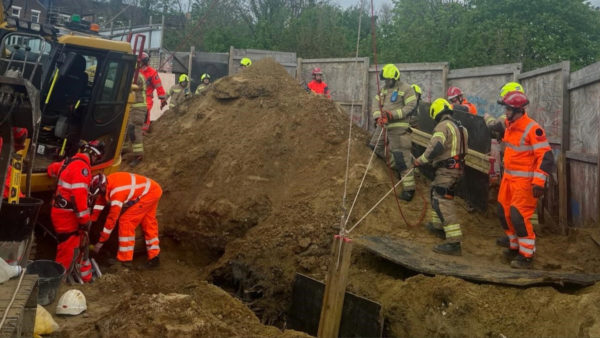
The overwhelming majority of construction workers fear that the prospect of manual work is putting young people off a career in the construction industry.
The finding came to light as part of a new Considerate Constructors Survey of more than 800 construction professionals in the UK and Ireland.
Despite the fact that 85% of respondents said they would recommend a construction career to young people, 84% also felt that the ongoing perception of construction as being manual work was the main reason it remains an unpopular career choice.
The survey also found that:
- 77% view the skills shortage as the most pressing issue facing the construction industry
- 72% cite the challenging nature of work as the main benefit of a construction career
- 53% know young people who are, or could be, interested in a construction career.
Asked what the industry can do to attract the next generation:
- 37% mentioned changing perception/promoting benefits
- 26% suggested engaging schools and colleges
- 15% mentioned apprenticeships and training.
In response to the findings, the Considerate Constructors Scheme has launched a campaign called "Spotlight on…the next generation". It aims to raise awareness of the wide range of resources, organisations, case studies, key information and guidance available to help construction to attract the future workforce.
The campaign contains a wide range of practical case studies of what organisations have done to help attract more people in to the industry. These include contributions from organisations such as: Balfour Beatty; Class of Your Own; Engie; Hobson and Porter; Kier; Laing O’Rourke; Mace; McLaughlin & Harvey; and Wates.
In addition, the Scheme has collaborated with CITB’s Go Construct initiative to produce promotional posters for registered sites, companies, suppliers, clients and professional partners to use to help attract potential workers to consider a career in construction.
The Considerate Constructors Scheme added that one of its key mechanisms to help improve perceptions of construction among school children, teachers and parents is through its industry mascots Ivor Goodsite and Honor Goodsite. In 2017, the mascots visited over 22,000 school children.
Considerate Constructors Scheme chief executive Edward Hardy said: “The shortage of new entrants in to the workforce is one of the most pressing issues facing the construction industry. With over 400,000 new recruits needed each year to deliver construction projects, we must all take steps to attract the next generation.
“While we do have a great industry, one that is working hard to improve its image – as evidenced by the fact that 85% of those within the industry would recommend a career in construction – we need to do so much more to continually improve our standards in order to drive the perception change much needed to make the industry more attractive.
“The Scheme’s Best Practice Hub is at the epicentre of helping to share best practice across construction. Through the ‘Spotlight on…the next generation’ campaign, we are delighted to use our reach and influence across the entire industry to help provide key resources to address this critical issue.”
Comments
Comments are closed.









Fear of Manual work puts young people off Construction!!!!!
Well if you bring them up on all these electronic devices that are operated from an armchair what do you expect???
Construction is basically an outdoor creative Industry with an end product that reflects traditionally labour intensive teamwork of the highest standards sometimes performed in very demanding circumstances.
Who is up for the Challenge ( Not many These Days!!!)
For many decades I have suggested annual 2 day “road shows” in all local secondary schools with all units of the Construction professionals, contractors, suppliers and technical colleges involved. These road shows to be organised across the county by the CIOB or similar with financial help from the CITB and all institutions. The timing would be agreed locally and be co-ordinated so that teams may plan for the best use of their time. By regularly informing students, parents and teachers of the vast opportunities for all in our industry we should help build a higher and accurate awareness of the construction process and hopefully fewer shortages of better qualified staff.
A good deal of practical hands-on and constructive work is a lot more rewarding than administrative desk work that lacks sight of any productive outcome. I value construction professionals who start life learning site skills and who develop a real appreciation of the building and engineering processes and interactions than those who don’t know how to do before they start to preach; irrespective of whether that is by way of apprenticeships or ‘sandwich’ type courses. ‘Manual’ does not mean just wielding a shovel. We’re trying to appeal to the wrong young people if they lack practical or creative aspirations.
Most graduates see construction as offering fewer benefits and opportunities compared with other industries. As a result, the industry struggles to recruit young people from a wider range of academic backgrounds beyond the vocational disciplines.
Those who do enter the industry frequently find that the working environment does not motivate them to fulfil their potential and that the skills development opportunities are inadequate. They also see that their prospects for career advancement are limited by the existence of a ‘permafrost’ of middle managers who joined a very different industry and act as a major barrier to change. This is especially true for any young
professional who has already gained a strategic understanding of how the
built environment can generate long-term value for society and the economy.
Some graduates also point to the failure of the industry to address the single most important issue that the next generation has to face – that of sustainable development and, in particular, a low-carbon economy. By not embracing the sustainable built environment agenda, we are missing out on a huge opportunity to attract young people to the industry.
A starting point to address these findings is for us to revisit the contribution of the educational sector and the role of professional institutions. One major reason why young people lack awareness of the industry is because some schools and universities often fail to understand and promote the opportunities effectively. While clearly the industry itself carries a responsibility in this respect, the educational sector could do much more to understand the needs of the industry it supports.
Moreover, in order to attract students, higher education providers have to demonstrate that their course content is accredited by the professional institutions, which tend to exist in parallel silos. While most universities have made efforts to introduce cross-disciplinary learning and joint project work, this falls short of enabling students to understand how the industry really works at a business and strategic level.
Compared to the manufacturing, consulting and banking sectors, we do not adequately equip new entrants with the skills needed to face complex challenges in the early phases of their careers. Nor do we provide the working environment and career development structures to attract and retain men and women striving to balance work and family, nor to secure a lifetime loyalty to the industry.
Furthermore, the industry lacks enough leaders who can communicate their vision and engage employees to think about the value of their input beyond their tactical horizon. Lack of visible leaders results in a low profile and poor industry brand.The industry lacks a clear mission, based on a strong ethical stance, for the contribution it makes to society. As a result, it struggles to present an effective image to the public and governments!